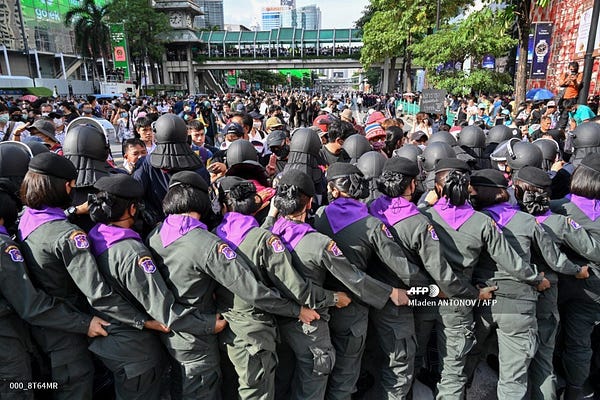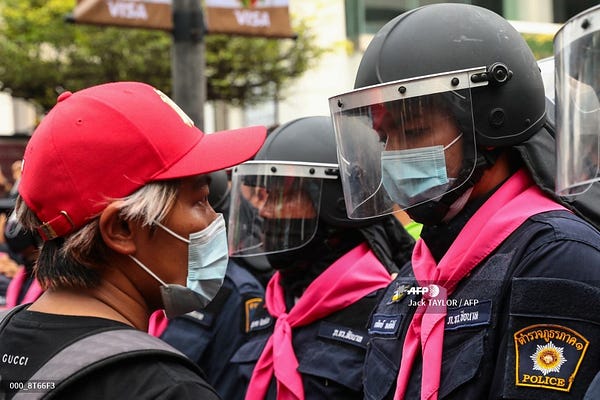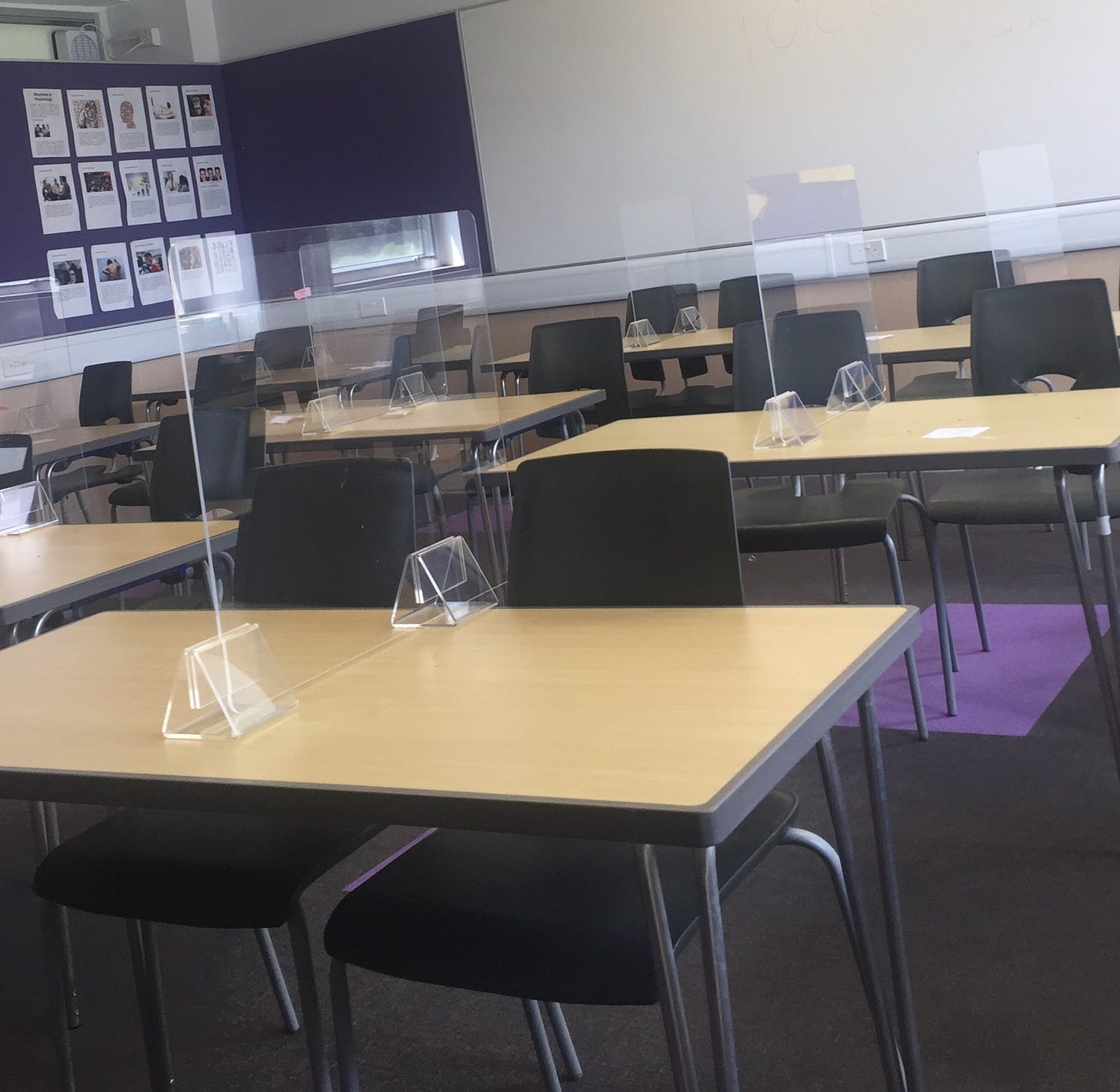Shenzhen's anniversary, clashes in Bangkok, virtual teaching Q&A and investing in BTS
12 - 18 October 2020
CELEBRATING SHENZHEN
From quiet fishing village to teeming metropolis, the transformation of Shenzhen is one of the CCP's favourite stories.
On Wednesday, Xi Jinping delivered a 50-minute speech (punctuated with coughing) to commemorate Shenzhen's 40th anniversary as China's first special economic zone. It remains a prized symbol of Deng Xiaoping's "opening up and reform" - a unique blend of state-sponsored liberalisation and private enterprise.
Often described as China's Silicon Valley, Shenzhen boasts a population of 12.5 million and serves as the headquarters to tech giants Huawei, ZTE and Tencent.
Another interesting facet of the city is its proximity to Hong Kong - the two are separated by a river and Shenzhen's skyline is visible from HK's northern New Territories. This closeness is the foundation of the Greater Bay Area (GBA), an integrated business hub created by linking HK and Macau with Shenzhen and the rest of Guangdong province.
Xi reiterated the CCP's GBA vision in Shenzhen. In the latest blueprint, the mainland city - not Hong Kong - will be the "core engine" driving economic expansion in the region.
Furthermore, Xi encouraged young Hongkongers to move across the border for work and study opportunities. It's worth noting that Carrie Lam postponed her annual policy address in order to attend the Shenzhen anniversary event.
OUT ON THE STREETS
Last month, I wrote about Thailand's "youthquake" - a student-led pro-democracy movement that was gaining momentum across the country. This week, tensions flared once again in Bangkok after thousands of activists defied an emergency decree banning large gatherings. Riot police fired water cannon, dispersed crowds and made arrests.





The demonstrations have escalated since Wednesday, when protesters yelled at a royal motorcade carrying the queen. The king, who resides primarily in Germany (Berlin has expressed concerns about this), is also in Thailand for a rare visit.
Thailand's prime minister, a former army general, says he won't resign or introduce constitutional reforms. Meanwhile, the growing powers and multi-billion dollar fortune of the country's monarchy are coming under increased scrutiny, indicating that an age-old taboo has been broken.
THE VIRTUAL CLASSROOM
Covid-19 continues to massively disrupt the education sector, from kindergarten to university. As the authorities grapple with the health crisis, millions of kids and teenagers around the world have seen their normal routines turned upside down.
I spoke to an international school teacher in Hong Kong (who wished to remain anonymous) about the impact of the pandemic.
Q. Hundreds of teachers in HK were forced to embrace work-from-home for most of this year. How difficult was that switch for you and your colleagues?
The most challenging thing was adapting our teaching strategies and pedagogy to online learning, for instance, using platforms like Zoom. Initially, these programmes were new to us and therefore required a period of training and familiarisation. We then had to change or rethink all of our lesson plans to suit this online environment.
Maintaining the students’ privacy at home was a top priority at my school, so their cameras were off for the most part. But managing behaviour and checking student engagement are difficult tasks when you can't even see them! There were also distractions from Wi-Fi/connectivity issues.
Unsurprisingly, “Zoom fatigue” became a big issue for everyone. In my department, my colleagues and I were in front of screens for 10-13 hours a day because planning, marking, administration and teaching were all done online. I don't think I’ve ever received this many emails in my 10 years of teaching. Contacting parents, constant updates, following up on missed work etc. - the workload just doubled overnight.
Q. How did your students adjust to virtual classrooms? Do you think “Zoom school” is a sustainable model in the long term?
All of the students in our school have laptops, so that was an advantage. I’d say they were more agile than the teachers overall, but some struggled in the online learning environment while others thrived.
The success of “Zoom school” really depends on the subject and the teacher. For practical subjects, e.g. design, sciences, performance art, it’s pretty hard. I think a blended learning model, or a sort of hybrid of Zoom and face-to-face, would be sustainable.
But there’s nothing like being able to chat to students individually in class or giving immediate feedback in person. Plus, there are always going to be some slippery students and getting them on track is much tougher to do online.
Q. You're now back on campus full time. What protocols are in place to ensure safety? How do these measures affect the school experience?
We wear masks and keep one metre distance from each other. There’s hand sanitiser all around the school and temperature checks are done in the morning. Seating has changed from groups to forward-facing rows, and there are clear acetate barriers between students in the classrooms and dining venues. The younger years actually go home for lunch, where they continue with online lessons.
Of course, this set up makes collaboration and group projects harder; discussion is now a whole class activity instead of being based around smaller groups, and so on. But, personally, I still feel this is better than online learning.
BTS = BIG BUCKS?
Scores of K-pop fans are now financially invested in the genre's superstars, BTS.
The management agency behind the mega boy band, Big Hit Entertainment, made its stock market debut in Seoul on Thursday. The company's shares nearly doubled in value at the open before cooling slightly to end the day 90% higher than the IPO price. Friday trading was rockier, however, with shares tumbling as much as 23%.


Yet thanks to enthusiastic demand from the loyal BTS Army, each of the group's seven members is a multi-millionaire - and Big Hit's CEO can call himself a billionaire.
But equity analysts have raised red flags about the agency's long-term profitability. For one, pop music is notoriously fickle and Big Hit is almost entirely reliant on BTS for revenue. Secondly, the BTS lads are not exempt from South Korea's compulsory military service (their deadline to enlist is fast approaching).
For the moment, 2020 tour cancellations haven't dented album sales or YouTube views. In fact, BTS won Top Social Artist at the recent Billboard Music Awards for a fourth year in a row.




